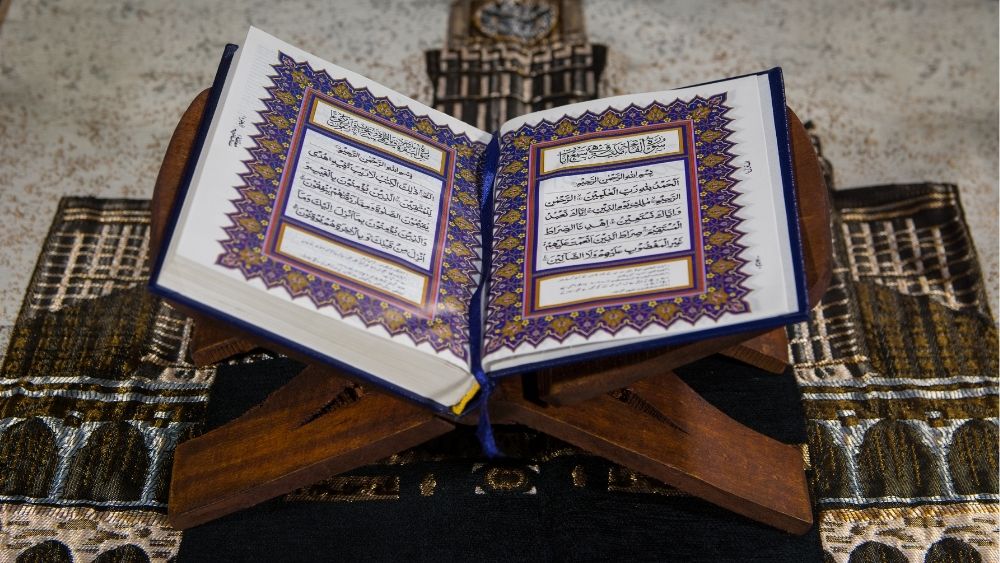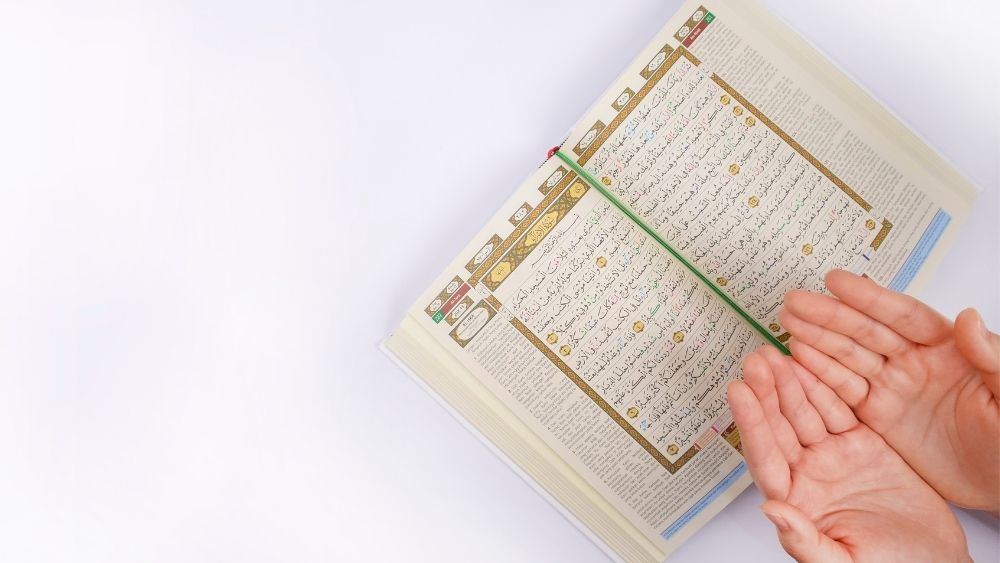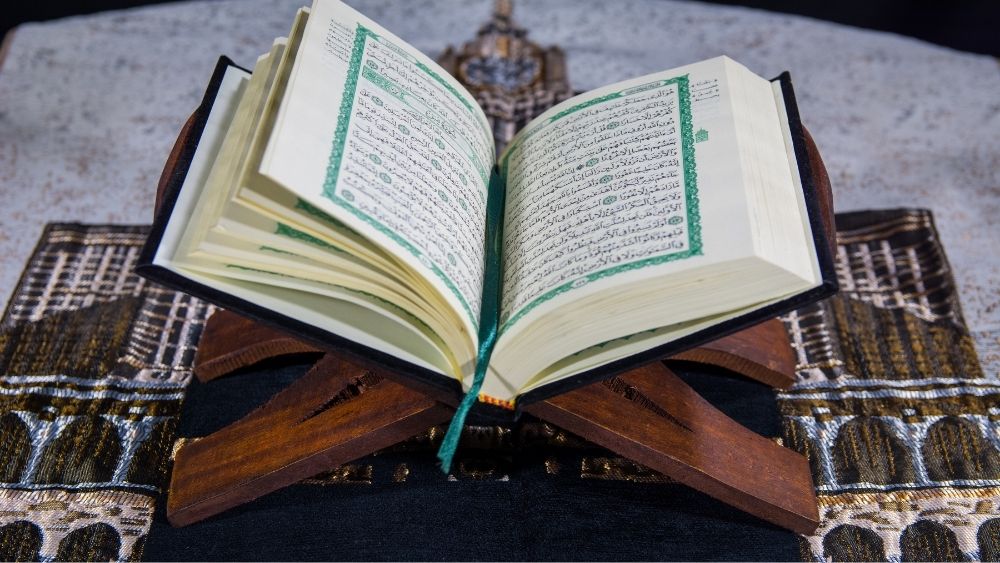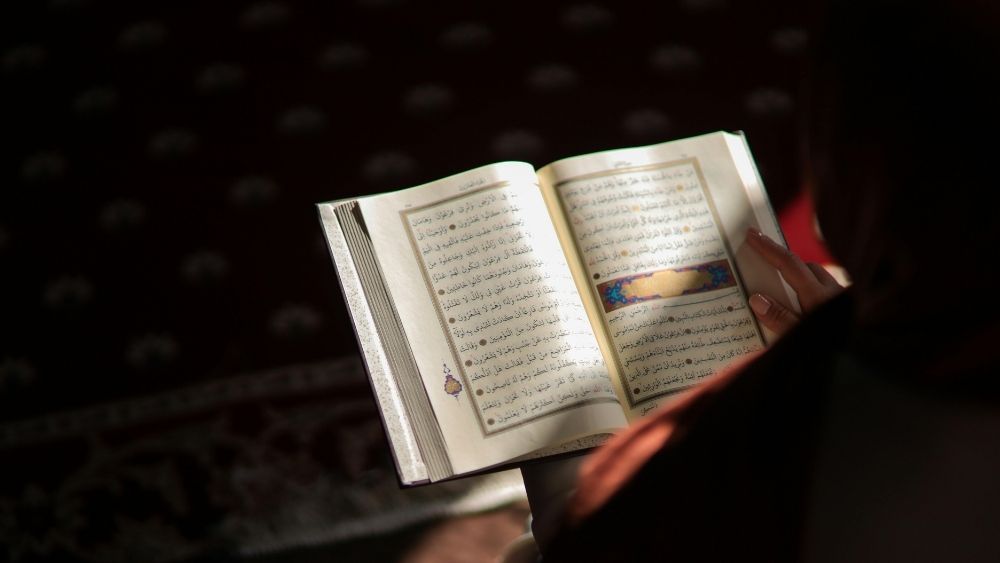Quran Verses About Ramadan and Fasting

Ramadan is a deeply cherished month for Muslims, filled with blessings and compassion from Allah. Central to this sacred time is fasting, a form of worship clearly outlined in the Quran. Interestingly, fasting isn’t only associated with Ramadan; the Quran also emphasizes its importance at other times and shares stories of how previous nations engaged in this practice.
In this article, we’ll look at the connection between Ramadan and the Quran, explore Quranic verses related to Ramadan and fasting, and discover lessons from these verses. Let’s start with the name of Allah, the Most Merciful, the Most Compassionate.
What Does the Quran Say About Ramadan?
Allah says in the Quran:
شَهْرُ رَمَضَانَ ٱلَّذِىٓ أُنزِلَ فِيهِ ٱلْقُرْءَانُ هُدًۭى لِّلنَّاسِ وَبَيِّنَـٰتٍۢ مِّنَ ٱلْهُدَىٰ وَٱلْفُرْقَانِ ۚ فَمَن شَهِدَ مِنكُمُ ٱلشَّهْرَ فَلْيَصُمْهُ ۖ وَمَن كَانَ مَرِيضًا أَوْ عَلَىٰ سَفَرٍۢ فَعِدَّةٌۭ مِّنْ أَيَّامٍ أُخَرَ ۗ يُرِيدُ ٱللَّهُ بِكُمُ ٱلْيُسْرَ وَلَا يُرِيدُ بِكُمُ ٱلْعُسْرَ وَلِتُكْمِلُوا۟ ٱلْعِدَّةَ وَلِتُكَبِّرُوا۟ ٱللَّهَ عَلَىٰ مَا هَدَىٰكُمْ وَلَعَلَّكُمْ تَشْكُرُونَ ١٨٥
Meaning: “The month of Ramadan [is that] in which was revealed the Quran, a guidance for the people and clear proofs of guidance and criterion [to distinguish between truth and falsehood]. So whoever sights [the crescent of] the month, let him fast it; and whoever is ill or on a journey – then an equal number of other days. Allah intends for you ease and does not intend for your hardship and [wants] for you to complete the period and to glorify Allah for that [to] which He has guided you; and perhaps you will be grateful.” [Surah Al Baqarah: 185]
This verse teaches us several key lessons:
- The glorious Quran was revealed during Ramadan as the ultimate guidance and criterion to distinguish truth from falsehood for the entire humanity.
- Fasting during Ramadan is obligatory for every able Muslim.
- Concessions are given to those who are ill or travelling.
- Ramadan is a time to glorify Allah and show gratitude for His guidance.

Why was Fasting Prescribed?
Allah explains the purpose of fasting in the Quran:
يَـٰٓأَيُّهَا ٱلَّذِينَ ءَامَنُوا۟ كُتِبَ عَلَيْكُمُ ٱلصِّيَامُ كَمَا كُتِبَ عَلَى ٱلَّذِينَ مِن قَبْلِكُمْ لَعَلَّكُمْ تَتَّقُونَ ١٨٣
Meaning: “O you who have believed, decreed upon you is fasting as it was decreed upon those before you that you may become righteous.” [Surah Al Baqarah, 2 : 183]
This Ayah reveals two profound facts. They are:
- The ultimate goal of fasting is to attain ‘Taqwa’ (righteousness and consciousness of Allah)
- The obligation of fasting is not unique to the Ummah of Muhammad ﷺ, rather it was prescribed to the previous nations as well.

Rules of Fasting Mentioned in the Quran
Allah (SWT) has provided clear instructions and rules for fasting in the Quran. They are as follows:
- When ill or Traveling
Allah says in the Quran:
أَيَّامًۭا مَّعْدُودَٰتٍۢ ۚ فَمَن كَانَ مِنكُم مَّرِيضًا أَوْ عَلَىٰ سَفَرٍۢ فَعِدَّةٌۭ مِّنْ أَيَّامٍ أُخَرَ ۚ وَعَلَى ٱلَّذِينَ يُطِيقُونَهُۥ فِدْيَةٌۭ طَعَامُ مِسْكِينٍۢ ۖ فَمَن تَطَوَّعَ خَيْرًۭا فَهُوَ خَيْرٌۭ لَّهُۥ ۚ وَأَن تَصُومُوا۟ خَيْرٌۭ لَّكُمْ ۖ إِن كُنتُمْ تَعْلَمُونَ ١٨٤
Meaning: “[Fasting for] a limited number of days. So whoever among you is ill or on a journey [during them] – then an equal number of other days [are to be made up]. And upon those who are able [to fast, but with hardship] – a ransom [as substitute] of feeding a poor person [each day]. And whoever volunteers good [i.e., excess] – it is better for him. But to fast is best for you, if you only knew.” [Surah Al Baqarah, 2 : 184]
- How Long to Fast?
Allah commands:
ثُمَّ أَتِمُّوا۟ ٱلصِّيَامَ إِلَى ٱلَّيْلِ ۚ
Meaning: “Then complete the fast until the night [i.e., sunset].” [Surah Al Baqarah, 2 : 187]
- Permitted Time to Eat Before Fasting
Allah describes in the Quran:
وَكُلُوا۟ وَٱشْرَبُوا۟ حَتَّىٰ يَتَبَيَّنَ لَكُمُ ٱلْخَيْطُ ٱلْأَبْيَضُ مِنَ ٱلْخَيْطِ ٱلْأَسْوَدِ مِنَ ٱلْفَجْرِ ۖ
Meaning: “And eat and drink until the white thread of dawn becomes distinct to you from the black thread [of night].” [Surah Baqarah, 2 : 187]
- Permissibility of Relation with Wife at Night
Allah says in the Quran:
أُحِلَّ لَكُمْ لَيْلَةَ ٱلصِّيَامِ ٱلرَّفَثُ إِلَىٰ نِسَآئِكُمْ ۚ هُنَّ لِبَاسٌۭ لَّكُمْ وَأَنتُمْ لِبَاسٌۭ لَّهُنَّ ۗ
Meaning: “It has been made permissible for you the night preceding fasting to go to your wives [for sexual relations]. They are a clothing for you and you are a clothing for them.” [Surah Baqarah, 2 : 187]

Stories of Fasting of Past Nations
As already mentioned above, Allah hasn’t prescribed fasting to the Ummah of Muhammad ﷺ exclusively. He has prescribed fasting to previous nations as well. There are a few instances of fasting of past nations mentioned in the Quran. They are as follows:
Fasting of Maryam (AS)
Maryam (AS) was an icon of belief and chastity. After feeling overwhelmed with the labour of birth of Isa (AS), Allah comforted her through a special fast. She was to eat, drink and find solace but not to speak to anyone. Allah says in the Quran:
فَكُلِى وَٱشْرَبِى وَقَرِّى عَيْنًۭا ۖ فَإِمَّا تَرَيِنَّ مِنَ ٱلْبَشَرِ أَحَدًۭا فَقُولِىٓ إِنِّى نَذَرْتُ لِلرَّحْمَـٰنِ صَوْمًۭا فَلَنْ أُكَلِّمَ ٱلْيَوْمَ إِنسِيًّۭا ٢٦
Meaning: “So eat, drink and cool your eyes. Then if you see any human being, say (to him), “I have vowed a fast (of silence) for the All-Merciful (Allah,) and therefore, I shall never speak to any human today.” [Surah Al Maryam, 19 : 26]
Through this silence, Maryam (AS) directed her focus entirely toward Allah. Although this is different from how we fast, she indeed attained the essence of fasting by gaining righteousness and consciousness of Allah.
The Fasting of Zakariya (AS)
This is the story of the prophet Zakariya (AS) and is similar to that of Maryam (AS). In fact, it starts right after his conversation with Maryam (AS). Zakariya (AS) was longing for an offspring and prayed to Allah for a son. When Allah gave him the good news of a blessed child (Yahya AS), he was overwhelmed by this blessing and asked Allah for a sign.
Allah gave him a sign: Zakariya (AS) could not speak to people for 3 days except through gestures. Allah says in the Quran:
قَالَ رَبِّ ٱجْعَل لِّىٓ ءَايَةًۭ ۖ قَالَ ءَايَتُكَ أَلَّا تُكَلِّمَ ٱلنَّاسَ ثَلَـٰثَةَ أَيَّامٍ إِلَّا رَمْزًۭا ۗ وَٱذْكُر رَّبَّكَ كَثِيرًۭا وَسَبِّحْ بِٱلْعَشِىِّ وَٱلْإِبْكَـٰرِ ٤١
Meaning: “He (Zakariya) said: “O my Lord, set for me a sign.” He (Allah) replied: “Your sign is that you shall not be able to speak to people for three days except through gestures. Remember your Lord much; and proclaim His purity in the evening and the morning.” [Surah Ale Imran, 3: 41]
This miraculous silence became an act of worship, allowing Zakariya (AS) to attain Taqwa and thank Allah for giving him a blessed son.
Lesson from These Stories
Both Maryam (AS) and Zakariya (AS) demonstrated how fasting—whether through silence or as a miracle—can bring one closer to Allah. Maryam (AS) obeyed Allah’s command, while Zakariya (AS) experienced it as a sign of Allah’s power. In both cases, they achieved righteousness by retreating from worldly distractions and dedicating themselves to Allah.
Our beloved Prophet Muhammad (ﷺ) also used this same method to come closer to Allah. He would spend the last 10 days of Ramadan in I’tikaf; secluding himself in the masjid for worship and remembrance of Allah. These stories remind us that fasting is not just abstaining from food and drink, but an opportunity to deepen our connection with Allah, seeking His pleasure and guidance.

Other Types of Fasting: What Does the Quran Say?
While Ramadan is the primary month of fasting, the Quran also mentions other instances of the obligation of fasting as well. Here are the cases:
- When Unable to Find an Animal for Sacrifice During Hajj
Anyone who can’t find or afford an animal for sacrifice during Hajj, Allah orders them to fast instead. Allah says in the Quran:
فَمَن لَّمْ يَجِدْ فَصِيَامُ ثَلَـٰثَةِ أَيَّامٍۢ فِى ٱلْحَجِّ وَسَبْعَةٍ إِذَا رَجَعْتُمْ ۗ تِلْكَ عَشَرَةٌۭ كَامِلَةٌۭ ۗ ذَٰلِكَ لِمَن لَّمْ يَكُنْ أَهْلُهُۥ حَاضِرِى ٱلْمَسْجِدِ ٱلْحَرَامِ ۚ وَٱتَّقُوا۟ ٱللَّهَ وَٱعْلَمُوٓا۟ أَنَّ ٱللَّهَ شَدِيدُ ٱلْعِقَابِ ١٩٦
Meaning: “And whoever cannot find [or afford such an animal for sacrifice] – then a fast of three days during ḥajj and of seven when you have returned [home]. Those are ten complete [days]. This is for those whose family is not in the area of al-Masjid al-Ḥarām. And fear Allāh and know that Allāh is severe in penalty. [Surah Al Baqarah, 2 : 196]
- Expiation for Breaking an Intentional Vow/Oath
If someone breaks an intentional vow, fasting is prescribed as one of the forms of expiation. Allah says in the Quran:
لَا يُؤَاخِذُكُمُ ٱللَّهُ بِٱللَّغْوِ فِىٓ أَيْمَـٰنِكُمْ وَلَـٰكِن يُؤَاخِذُكُم بِمَا عَقَّدتُّمُ ٱلْأَيْمَـٰنَ ۖ فَكَفَّـٰرَتُهُۥٓ إِطْعَامُ عَشَرَةِ مَسَـٰكِينَ مِنْ أَوْسَطِ مَا تُطْعِمُونَ أَهْلِيكُمْ أَوْ كِسْوَتُهُمْ أَوْ تَحْرِيرُ رَقَبَةٍۢ ۖ فَمَن لَّمْ يَجِدْ فَصِيَامُ ثَلَـٰثَةِ أَيَّامٍۢ ۚ ذَٰلِكَ كَفَّـٰرَةُ أَيْمَـٰنِكُمْ إِذَا حَلَفْتُمْ ۚ وَٱحْفَظُوٓا۟ أَيْمَـٰنَكُمْ ۚ كَذَٰلِكَ يُبَيِّنُ ٱللَّهُ لَكُمْ ءَايَـٰتِهِۦ لَعَلَّكُمْ تَشْكُرُونَ ٨٩
Meaning: “Allāh will not impose blame upon you for what is meaningless in your oaths, but He will impose blame upon you for [breaking] what you intended of oaths. So its expiation is the feeding of ten needy people from the average of that which you feed your [own] families or clothing them or the freeing of a slave. But whoever cannot find [or afford it] – then a fast of three days [is required]. That is the expiation for oaths when you have sworn. But guard your oaths. Thus does Allāh make clear to you His verses [i.e., revealed law] that you may be grateful.” [Surah Al Maidah, 5 : 89]
P.S. For details about frequent vow-breaking and its rulings, please refer to this link. Remember, fasting is the last option for expiation. You should consult a knowledgeable scholar to confirm its application to your situation.
- Two Months of Consecutive Fasting After Saying Zihar to Wife
Zihar is a forbidden act in Islam where a husband tells his wife, “You are to me like the back of my mother,” implying she is unlawful to approach. This was a pre-Islamic practice of divorce, which Allah has prohibited due to its disrespectful nature. The expiation for Zihar is outlined in the Quran. Allah says:
وَٱلَّذِينَ يُظَـٰهِرُونَ مِن نِّسَآئِهِمْ ثُمَّ يَعُودُونَ لِمَا قَالُوا۟ فَتَحْرِيرُ رَقَبَةٍۢ مِّن قَبْلِ أَن يَتَمَآسَّا ۚ ذَٰلِكُمْ تُوعَظُونَ بِهِۦ ۚ وَٱللَّهُ بِمَا تَعْمَلُونَ خَبِيرٌۭ ٣ فَمَن لَّمْ يَجِدْ فَصِيَامُ شَهْرَيْنِ مُتَتَابِعَيْنِ مِن قَبْلِ أَن يَتَمَآسَّا ۖ فَمَن لَّمْ يَسْتَطِعْ فَإِطْعَامُ سِتِّينَ مِسْكِينًۭا ۚ ذَٰلِكَ لِتُؤْمِنُوا۟ بِٱللَّهِ وَرَسُولِهِۦ ۚ وَتِلْكَ حُدُودُ ٱللَّهِ ۗ وَلِلْكَـٰفِرِينَ عَذَابٌ أَلِيمٌ ٤
Meaning: “And those who pronounce ẓihār from their wives and then [wish to] go back on what they said – then [there must be] the freeing of a slave before they touch one another. That is what you are admonished thereby; and Allāh is Aware of what you do. And he who does not find [a slave] – then a fast for two months consecutively before they touch one another; and he who is unable – then the feeding of sixty poor persons. That is for you to believe [completely] in Allāh and His Messenger; and those are the limits [set by] Allāh. And for the disbelievers is a painful punishment.” [Surah Al Mujadilah, 58 : 3-4]
In summary, the expiation is:
i. Freeing a slave before resuming marital relations.
ii. If unable, fasting for two consecutive months.
iii. If unable to fast, feed sixty poor people.
These acts serve as a reminder to believe in Allah and His Messenger. Failing to fulfil these expectations before returning to the wife is a sin. So, if one commits Zihar, one must consult a knowledgeable scholar to determine the appropriate expiation. Fear Allah and avoid such statements.

- Two Months of Consecutive Fasting for Accidental Killing
Allah says in the Quran:
وَمَا كَانَ لِمُؤْمِنٍ أَن يَقْتُلَ مُؤْمِنًا إِلَّا خَطَـًۭٔا ۚ وَمَن قَتَلَ مُؤْمِنًا خَطَـًۭٔا فَتَحْرِيرُ رَقَبَةٍۢ مُّؤْمِنَةٍۢ وَدِيَةٌۭ مُّسَلَّمَةٌ إِلَىٰٓ أَهْلِهِۦٓ إِلَّآ أَن يَصَّدَّقُوا۟ ۚ فَإِن كَانَ مِن قَوْمٍ عَدُوٍّۢ لَّكُمْ وَهُوَ مُؤْمِنٌۭ فَتَحْرِيرُ رَقَبَةٍۢ مُّؤْمِنَةٍۢ ۖ وَإِن كَانَ مِن قَوْمٍۭ بَيْنَكُمْ وَبَيْنَهُم مِّيثَـٰقٌۭ فَدِيَةٌۭ مُّسَلَّمَةٌ إِلَىٰٓ أَهْلِهِۦ وَتَحْرِيرُ رَقَبَةٍۢ مُّؤْمِنَةٍۢ ۖ فَمَن لَّمْ يَجِدْ فَصِيَامُ شَهْرَيْنِ مُتَتَابِعَيْنِ تَوْبَةًۭ مِّنَ ٱللَّهِ ۗ وَكَانَ ٱللَّهُ عَلِيمًا حَكِيمًۭا ٩٢
Meaning: “And never is it for a believer to kill a believer except by mistake. And whoever kills a believer by mistake – then the freeing of a believing slave and a compensation payment [diyah] presented to his [i.e., the deceased’s] family [is required], unless they give [up their right as] charity. But if he [i.e., the deceased] was from a people at war with you and he was a believer – then [only] the freeing of a believing slave; and if he was from a people with whom you have a treaty – then a compensation payment presented to his family and the freeing of a believing slave. And whoever does not find [one or cannot afford to buy one] – then [instead], a fast for two months consecutively, [seeking] acceptance of repentance from Allāh. And Allāh is ever Knowing and Wise.” [Surah An Nisa, 4 : 92]
P.S. This is a very sensitive topic. Please learn further from a knowledgeable scholar.
- Fasting as an Expiation for Hunting/Killing Animals While in Ihram
Allah says in the Quran:
يَـٰٓأَيُّهَا ٱلَّذِينَ ءَامَنُوا۟ لَا تَقْتُلُوا۟ ٱلصَّيْدَ وَأَنتُمْ حُرُمٌۭ ۚ وَمَن قَتَلَهُۥ مِنكُم مُّتَعَمِّدًۭا فَجَزَآءٌۭ مِّثْلُ مَا قَتَلَ مِنَ ٱلنَّعَمِ يَحْكُمُ بِهِۦ ذَوَا عَدْلٍۢ مِّنكُمْ هَدْيًۢا بَـٰلِغَ ٱلْكَعْبَةِ أَوْ كَفَّـٰرَةٌۭ طَعَامُ مَسَـٰكِينَ أَوْ عَدْلُ ذَٰلِكَ صِيَامًۭا لِّيَذُوقَ وَبَالَ أَمْرِهِۦ ۗ عَفَا ٱللَّهُ عَمَّا سَلَفَ ۚ وَمَنْ عَادَ فَيَنتَقِمُ ٱللَّهُ مِنْهُ ۗ وَٱللَّهُ عَزِيزٌۭ ذُو ٱنتِقَامٍ ٩٥
Meaning: “O you who have believed, do not kill game while you are in the state of iḥrām. And whoever of you kills it intentionally – the penalty is an equivalent from sacrificial animals to what he killed, as judged by two just men among you as an offering [to Allāh] delivered to the Kaʿbah, or an expiation: the feeding of needy people or the equivalent of that in fasting, that he may taste the consequence of his matter [i.e., deed]. Allāh has pardoned what is past; but whoever returns [to violation], then Allāh will take retribution from him. And Allāh is Exalted in Might and Owner of Retribution.” [Surah Al Ma’idah, 5 : 95]
FAQs
Q. In which year was the fasting of Ramadan first prescribed?
Ans. Fasting of Ramadan was first prescribed in the 2nd year of Hijri.
Q. How many times has fasting been mentioned in the Quran?
Ans. The word fasting (Arabic: صِيَام) and its different forms have been mentioned in 11 verses of the Quran.
Conclusion
Ramadan and fasting are deeply connected with the Quran, as the Quran was revealed during this blessed month, and fasting is a direct command from Allah. Quranic verses about Ramadan and fasting remind us that this sacred act is all about the pursuit of attaining Taqwa.
By reflecting on what the Quran says about Ramadan, we can strengthen our connection with Allah through fasting, prayer, and charity. Let the Quran be your guide this Ramadan to make it a time of unbound blessings and forgiveness from Allah, and a chance for self-actualization. May Allah accept from us our good deeds.
References:
- Surah Al-Baqarah (2:183)
- Surah Al-Baqarah (2:184)
- Surah Al-Baqarah (2:185)
- Surah Al-Baqarah (2:187)
- Surah Al-Baqarah (2:196)
- Surah An Nisa (4:92)
- Surah Al Ma’idah (5:89)
- Surah Al Ma’idah (5:95)
- Surah Maryam (19:26)
- Surah Al Mujadilah (58:4)
- Surah Al Ahzab (33:35)


